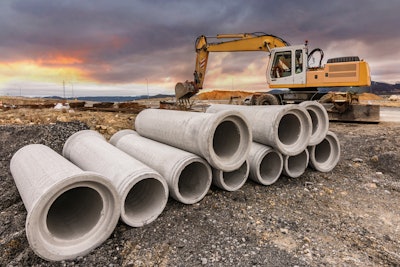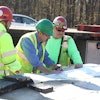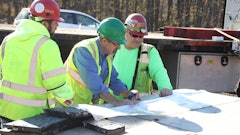
Construction contractor confidence should be dwindling given the mounting number of challenges they face every day, but a new report from the Dodge Construction Network found that nearly three-quarters of contractors are "highly optimistic" about the volume of work they expect in the next year.
The report, based on a quarterly survey of civil contractors, engineers and owners, reveals a dramatic increase in supply chain challenges faced by civil contractors. As a result, the vast majority of civil contractors (92%) have had projects impacted by fluctuations in the cost of construction materials in 2021. The report also found that 89% expressed concerns about cost increases for materials over the next six months, including prices for steel, piping, paving materials, lumber and aggregates.
Despite these concerns, over half (53%) expect to see increases in revenue and nearly two thirds (63%) expect to see their profit margins hold steady or grow in the next year. This is likely due to the fact that 71% are highly optimistic about the volume of work they expect in the next year.
"A growing number of contractors are indicating shortages of materials such as copper and PVC pipes," said ABC Chief Economist Anirban Basu. “Input prices also continue to increase as global supply chain disruptions persist. Rising shipping and trucking costs are further exacerbating the situation by placing additional upward pressure on input prices. Working in conjunction with skills shortages and attendant higher wages, rising input prices are resulting in lofty bids, inducing certain project owners to delay work and even cancel projects altogether in some instances. The good news is that demand for construction services remains elevated.”
Material Shortages Delaying Major Projects
With the demand for construction elevated along with the demand for supplies, projects all over the country are being delayed and contractors are feeling the pressure. These shortages stem from a series of supply-chain disruptions hitting industries around the world this year, from port congestion in Asia and the U.S. to labor shortages at factories. Heavy storms in Texas and Louisiana have also slowed production of some building materials, while semiconductor shortfalls have made appliances harder to secure.
Steel, roofing and insulation materials are some of the most difficult products to get right now, said Ken Simonson, chief economist at the Associated General Contractors of America. Bar joists, which are used to frame roofs, can have lead times of anywhere from 10 months to 22 months.
The construction industry did gain 22,000 jobs between August and September as nonresidential construction firms added employees for the first time in six months, but Association officials said nonresidential construction has been affected by the widespread supply chain problems.
“While it is refreshing to see job gains in both residential and nonresidential construction, nonresidential building and infrastructure employment remains far below its pre-pandemic peak,” said Ken Simonson, the association’s chief economist. “It will take more than a few months of gains to match the overall economy.”
Owners who are already uncertain about future demand for commercial space, are delaying or even cancelling some projects.
Earlier this year, tile destined for the terminal floor at the Juneau International Airport spent two extra and unexpected months at sea, causing a two-month delay.
At Dartmouth College, supply chain issues are causing delays in many projects around campus, including Dartmouth Hall, the Irving Institute for Energy and Society and the Center for Engineering and Computer Science.
When Public Service Company of New Mexico abandons the coal-fired San Juan Generating Station in June, the utility won’t have enough solar replacement power to pick up the slack because of supply chain issues caused by the global pandemic. Three of the four solar projects meant to replace the coal plant won’t be fully operating until well after San Juan’s closure, creating potential power supply issues when consumer demand peaks in summer 2022.
And the list of situations similar to these project delays, continues on.
This week, the Tennessee Department of Transportation announced that due to unforeseen supply chain issues, the completion of the Mack Hatcher Northwest Extension in Franklin would be delayed.
According to Eutaw Construction, the delay stems from a materials supply shortage of railing on the project’s multi-use path along the roadway. The railing must be completed to ensure the safety of pedestrians and/or cyclists on the path.
As far as how long the delays will last is unknown. In the meantime, the economic consequences will be measured in prices and inflation – and in those delays.


















